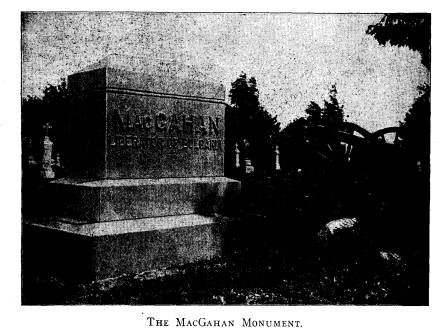Ohio History Journal
226 Ohio Arch. and Hist.
Society Publications.
JANUARIUS ALOYSIUS MACGAHAN.
Eulogy by William A. Taylor.
Many years ago, when a boy attending
Dist. No. 6 school
in Harrison township, I was deeply, but
not then favorably, im-
pressed by this sentence in Kirkham's
Grammar: "The evil that
men do lives after them; the good is
often interred with their
bones," which I was called on to
parse, analyse and expatiate on
generally, by my teacher Philander H.
Binckley, student, phil-
osopher, literary writer and profound
scholar, well-known to
many, and heard of by all of you.
For a long it seemed to me that this
assigned greater prom-
inence and power to evil than to good.
Else why should evil
survive uninterruptedly, and good be
buried at least for a great
portion of the time, with the bones of
the doers?
But the lapse of time and a continuity
of observation, con-
vinced me that the ancient axiom-maker
was not mistaken, that
the evil that men do lives after them,
not to honor their memory
but to reproach it, and warn the
oncoming generations not to
erect their monuments of misshapen deeds
of evil, crowned with
stinging thistles and rankling brambles.
True enough, the good
that men do is often buried with them,
but "often" is only a
small fraction of "always,"
and it is the surviving good that
not only stands as a monument of
approbation, but borders the
highways, on the right and the left,
with glorious flowers and
stately palms, cooling springs,
winnowing zephyrs, whispering of
both the past and the yet to be, and
crowning all the beckoning
vistas of the far beyond -the
Ultima Thule of life and effort
and activity and self-abnegation. To
attain this high altitude,
is, as it should be, the true aim of
life, in whatever sphere of
activity our mission and our labors lie.
None are too exalted
to fire our ambition; none too humble to
deserve our fullest ef-
fort. This was the spirit which animated
the men whose name
and fame and achievements are here to
commemorate and dedi-
cate to posterity, the predestined
custodian of terrestrial fame.
Here among the rugged and versatile
beauties of his native
county, he was the child of nature and
the student of that history,
which marks the alternating eras of
progress and decadence of
|
The MacGahan Monument. 227 humanity and human achievement, across the broad parchment of time. With this mission accomplished, wearied and resting from his more than Herculean labors, gazing through the gateway of the Orient, with the white sails on the Sea of Marmora flitting like ghosts before his dimming eyes, he stepped from the Here into the Hereafter leaving behind him only those good deeds which were wrought for the cause of man and the betterment |
|
|
|
of civilization. The feigned achievement of the classic heroes and demigods furnished forth in the poetic garniture of Homer and other contemporaneous poets, are outshone by the plain nar- ration of the achievements of our Perry county boy, student, teacher, journalist, hero and liberator. Remember that what he did are but the plain narration of deeds achieved in accordance with natural laws over natural impediments. Not as in the cases of the classic heroes, demigods and myths, |
228
Ohio Arch. and Hist. Society Publications.
by assumed super and supra-natural
means, but in accordance
with the laws which govern in the every
day world of to-day.
The twelve labors of Hercules were not
more onerous, nor more
beset with impending perils, than were
his efforts in the council
chambers of chancellories and the
closets of cabinets, none the
less along nervous lines of gathering
armies, in his task of arous-
ing supine Europe to the point of
stamping out the nameless
atrocities being heaped upon the people
of a helpless principality.
His unattained and interdicted ride from
the headquarters
of the Russian army to Khiva, in open
defiance of the orders
of the grim commander, with drumhead
court martial and sum-
mary execution, as the alternative of
disobedience, has no par-
allel in classic literature, where
poetic imagination supplies every
gap in the continuity of events.
The final rounding out of his life's
mission, the deliverance
of the Principality of Bulgaria from the
merciless hand of the
Moslem Spoiler, is one of the
established facts in the nineteenth
century history, more heroic, more
knightly, more god-like, in
every respect than the fabled
achievement of Perseus in rescuing
Andromeda, the daughter of the king of
Ethiopia, from the
greedy jaws of the Sea Monster.
Our Perry county Knight was indeed a
hero; one, without
fear and without reproach.
A BULGARIAN'S TRIBUTE TO MACGAHAN.
By Svetozar Tonjoroff.
To a Bulgarian the name of MacGahan is
fraught with
memories that stir the soul and send the
blood coursing faster
through the veins. For MacGahan was the
first champion of
an oppressed people before the world's
tribunal. It was MacGa-
han who, in the Bulgarian revolution
against savage tyranny in
1876, closed the lying mouths of British
diplomats and British
bondholders, thirsty for the payment of
maturing Turkish cou-
pons, by placing the damning facts of
Turkish misrule before
the collective conscience of the
English-speaking races. It was
a service which the Bulgarians will
never forget so long as
history lasts.
